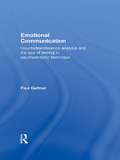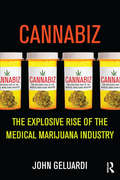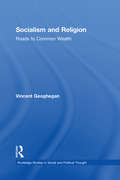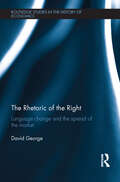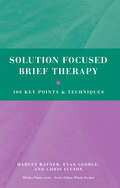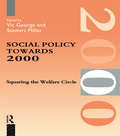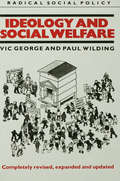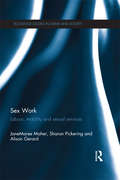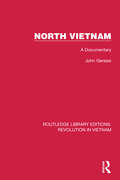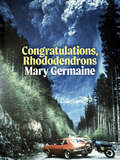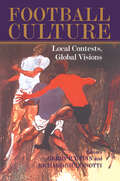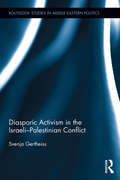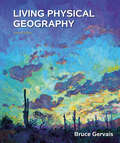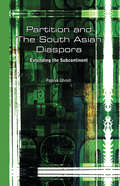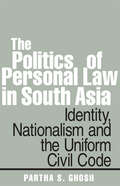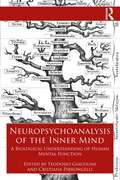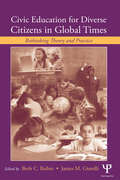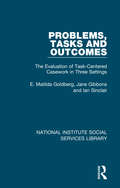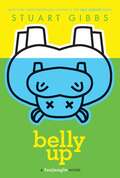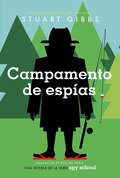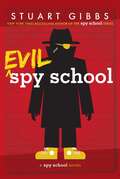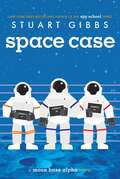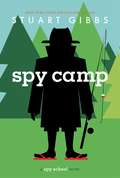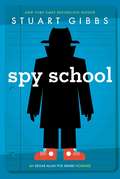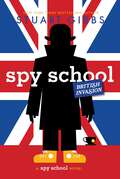Special Collections
Benetech’s Global Certified Accessible Titles
Description: Benetech’s GCA program is the first independent third-party EPUB certification to verify ebook accessibility. By creating content that is born accessible, publishers can meet the needs of all readers. Learn more: https://bornaccessible.benetech.org/
- Table View
- List View
Emotional Communication
by Paul GeltnerWhat role does animal like and infantile communication play in life and in psychoanalysis? How are painful childhood experiences recreated with people who are nothing like the original family? What are the roles of loving and horrible feelings in psychoanalytic cure? In Emotional Communication, Paul Geltner places the pre-linguistic type of communication that is shared with infants and animals at the core of the psychoanalytic relationship. He shows how emotional communication intertwines with language, permeating every moment of human interaction, and becoming a primary way that people involuntarily recreate painful childhood relationships in current life. Emotional Communication integrates observations from a number of psychoanalytic schools in a cohesive but non-eclectic model. Geltner expands psychoanalytic technique beyond the traditional focus on interpretation and the contemporary focus on authenticity to include the use feelings that precisely address the client's repetitive patterns of misery. The author breaks down analytic interventions into their cognitive and emotional components, describing how each engages a different part of the client's mind and serves a different function. He explains the role of emotional communication in psychoanalytic technique both in classical interpretations and in non-interpretive interventions that use the analyst's feelings to amplify the therapeutic power of the psychoanalytic relationship. Offering a clear alternative to both Classical and contemporary Relational and Intersubjective approaches to understanding and treating clients in psychoanalysis, Paul Geltner presents a theory of communication and maturation that will interest psychoanalysts, psychotherapists, and those concerned with the subtleties of human relatedness.
Cannabiz
by John GeluardiCannabiz tells one the most important political and business stories of our generation: the transformation of a counterculture movement into a growth industry with staggering potential. Charting the rise of medical marijuana in California and 14 other states, award-winning journalist John Geluardi vividly recounts the movement’s early activism, its legal challenges and victories, and its emergence as a commercial and political force.Tracing the history of marijuana in the United States, Cannabiz also reports on the industry’s key players, political allies and opponents, internal strife, and audacious aspirations—including a 2010 ballot initiative to legalize the adult use of marijuana in California. Along the way, Geluardi describes local efforts to regulate dispensaries, ranging from workable ordinances in some cities to bureaucratic paralysis in Los Angeles, where dispensaries came to outnumber McDonalds franchises. He also reports on efforts in Humboldt County, the heartland of marijuana cultivation, to keep pot illegal—and prices high. Adroitly profiling this unique industry, Cannabiz tells a distinctively American story—one whose colorful characters and fascinating details evoke Prohibition and the Gold Rush.
Socialism and Religion
by Vincent GeogheganIn the past decade philosophers and political theorists have increasingly pondered the role of religion in a modern secular society, and of the possible value of religion as a resource for contemporary thinking. The global resurgence of a new religious politics – graphically symbolised by 9/11 - has added a new urgency to this project; how is religion to be integrated, and if necessary contested, in such a time? As this study shows, the desire to integrate religion into a ‘progressive’ politics is not new. Providing a comprehensive analysis of the Common Wealth movement, this work seeks to bring together for the first time the religious and political commitments of four of the leading thinkers in the movement, bringing to light the significance of the relationships between them. This study examines at four interwar British radicals – the philosopher John Macmurray, the novelist and sexual theorist Kenneth Ingram, the Science Fiction writer Olaf Stapledon, and the Liberal M.P. Richard Acland – and examines their attempts to develop a socialism that whilst defending the achievements of the secular age was also sensitive to the virtues of religious traditions. Thus it considers Macmurray’s attempt to draw on the seemingly antagonistic traditions of Marxism and Christianity, Ingram’s long struggle to develop a Christian response to ‘deviant’ sexual behaviour, Stapledon’s exploration of a non-Christian religious spirit, and Acland’s journey from liberal atheist to Christian socialist. It then follows the activities of all four in the radical political movement founded by Acland in the midst of the Second World War, Common Wealth, particularly focusing on the positions they took in the serious battles over the function of religion that convulsed the leadership of this body. This work will be of great interest to scholars of political theory, religious studies, social and political thought.
The Rhetoric of the Right
by David GeorgeThis study seeks to demonstrate the subtle ways in which changes in the language associated with economic issues are reflective of a gradual but quantifiable conservative ideological shift. In this rigorous analysis, David George uses as his data a century of word usage within The New York Times, starting in 1900. It is not always obvious how the changes identified necessarily reflect a stronger prejudice toward laissez-faire free market capitalism, and so much of the book seeks to demonstrate the subtle ways in which the changing language indeed carries with it a political message. This analysis is made through exploration of five major areas of focus: "economics rhetoric" scholarship and the growing "behavioral economics" school of thought; the discourse of government and taxation; the changing meaning of "competition," and "competitive"; changing attitudes toward labor; and the celebration of growth relative to the decline in attention to economic justice and social equality.
Solution Focused Brief Therapy
by Evan George and Harvey Ratner and Chris IvesonSolution Focused Brief Therapy: 100 Key Points and Techniques provides a concise and jargon-free guide to the thinking and practice of this exciting approach, which enables people to make changes in their lives quickly and effectively. It covers: The history and background to solution focused practice The philosophical underpinnings of the approach Techniques and practices Specific applications to work with children and adolescents, (including school-based work) families, and adults How to deal with difficult situations Organisational applications including supervision, coaching and leadership. Frequently asked questions This book is an invaluable resource for all therapists and counsellors, whether in training or practice. It will also be essential for any professional whose job it is to help people make changes in their lives, and will therefore be of interest to social workers, probation officers, psychiatric staff, doctors, and teachers, as well as those working in organisations as coaches and managers.
Social Policy Towards 2000
by Vic George and Prof Vic George and Stewart MillerGovernments in all advanced industrial societies are involved in an endless struggle of how to 'square the welfare circle', as demand for public services rises due to demographic, social and labour market foctors. Government ability to finance this rising tide of public service demand is constrained by economic and, at times, ideological factors but failure to make welfare provision has adverse electoral consequeces. This is not an issue which is likely to go away. Social Policy Towards 2000 examines the issues and factors affecting the welfare state and by comparing the proposals of the three main UK political parties for the welfare system for the remaining part of the decade, offers a prospective analysis of the future of welfare.
Ideology and Social Welfare
by Paul Wilding and Victor GeorgeFirst Published in 1985. Routledge is an imprint of Taylor & Francis, an informa company.
Sex Work
by Sharon Pickering and Alison Gerard and JaneMaree MaherSex work has always attracted policy, public and prurient interest. Currently, legal frameworks in developed countries range from prohibition, through partial legalisation to active regulation. Globalisation has increased women’s mobility between developing and developed countries at the same time as women’s employment opportunities in the developed world are shifting. Family and intimate relationships are being transformed by changing demographics, shifting social mores and new intersections between intimate lives and global markets. Sex work is located at the nexus of new intimacies, shifting employment patterns and changing global mobilities. This volume examines the working lives of contemporary sex workers; their practices, their labour market conditions and their engagement with domestic and international regulatory frameworks. It locates the voices and experiences of workers in Melbourne, Australia, at the centre of the sexual services industry as they reflect on brothels and independent escort work, on working conditions and managers, and on the relationships they form with clients. It offers a new account of sex work where women’s labour and mobility is understood as central in local and global imperatives to offer sexual services. It examines how these new imperatives intersect with, challenge and exceed existing regulatory frameworks for sex work. Sex work: labour, mobility and sexual services draws together the everyday practices of sex workers and the broader global markets in which workers negotiate employment. In bringing together these two important intersecting areas, it offers a grounded and innovative account of sex work which will be of interest to academics and policy makers concerned with sex work, gender studies and the sociology of labour.
North Vietnam
by John GerassiJohn Gerassi went to North Vietnam as a member of the first investigating team for the International War Crimes Tribunal set up by the Bertrand Russell Peace Foundation. This book, first published in 1968, is the record of that visit and of the author’s sympathy for the ordinary people caught up in the conflict. It is primarily intended as a historical document, and provides valuable on-the-spot records of the war as experienced in North Vietnam.
Congratulations, Rhododendrons
by Mary GermaineIn her debut collection, Congratulations, Rhododendrons, award-winning poet Mary Germaine offers love poems to an insistently unlovely world.Through poems that speak to plastic bags and drones as much as they admire roses and the moon, Germaine surfs the confluence of artificial and natural environments, technology, and our small but consequential feelings about them. At turns devotional and suspicious, these poems toe the boundaries of intimacy, responsibility, and reason.In anxious times, anything can be taken as a sign; a crow, a talking coin, and a news report are all sources of information whose truth (or “fake-ness”) demand investigation. Germaine’s poems scroll from a shrine in Lourdes to an augmented-reality sandbox, from a mall filled with loitering ex–love interests to a fairy-tale ending where all the men turn out to be chairs. Funny, provocative, sly, and melancholic, Congratulations, Rhododendrons makes a case for the hope that every apparent disaster of social investment might in the end be redeemed as meaningful, genuine, or at least in some way helpful.
Football Culture
by Richard Giulianotti and Gerry P.T. FinnThese essays provide a critical investigation of football cultures, examining local and national impacts of the game's new millennial order over five continents.
Diasporic Activism in the Israeli-Palestinian Conflict
by Svenja GertheissWith their homelands at war, can Diasporas lead the way to peace, or do they present an obstacle to conflict resolution, nurturing hate far away from those who actually fall victim to violence? And which of these roles do the Jewish and Palestinian diaspora communities play in the Israeli-Palestinian conflict? Particularly since the Oslo peace process, the search for a solution to the Israeli-Palestinian conflict has been strongly contested among Jewish and Arab/Palestinian Organizations in the United States. Through an analysis of the activities of Arab-Palestinian and Jewish organizations on behalf of and towards their conflict-ridden homelands, Diasporic Activism in the Israeli-Palestinian Conflict provides both a detailed picture of diasporic activism in the Middle East as well as advancing theory-building on the roles of diasporas in helping or hindering peace. Drawing on research into (transnational) social movements, diaspora studies and constructivist International Relations theory, this book retraces how this process of diversification occurred, and explains why neither the Jewish nor the Arab Diaspora community hold a unified position in the Israeli-Palestinian conflict, but are each comprised of both hawks and doves. Combining theoretical depth and practical orientation, this book is a key resource for those working in the fields of Middle Eastern studies, Peace and Conflict Studies and Diapora Studies, as well as specialists on the ground in Israel/Palestine and other conflict settings in which Diaspora communities play a prominent role.
Living Physical Geography
by Bruce GervaisThe second edition of Bruce Gervais’ Living Physical Geography offers a fresh approach to the study of physical geography, combining print and digital media to create a scientifically substantive work that is written for students. Living Physical Geography focuses on human-physical geography interactions, using pedagogical features in the textbook and online in SaplingPlus to create a modern synthesis of the science of physical geography. In this, the most student-friendly book in the market, the authors Bruce Gervais has curated and designed all of the learning assets within the text and online in SaplingPlus. Each of the four major parts in Living Physical Geography focuses on energy flows within Earth’s physical systems. Additionally, landscape analysis underpins the body of the text. Step-by-step examples are used to illustrate how landforms and systems develop, evolve, and change through time.
Partition and the South Asian Diaspora
by Papiya GhoshPreface Acknowledgements Introduction 1. Negotiating nations 2. Claiming Pakistan 3. Resisting Hindutva 4. Redoing South Asia 5. Conclusion Bibliography Index
The Politics of Personal Law in South Asia
by Partha S. GhoshIt is a political study of the controversy surrounding the issue of the uniform civil code vis-à-vis personal laws from a South Asian perspective. At the centre of the debate is whether there should be a centralized view of the legal system in a given society or a decentralized view, both horizontally and vertically. This issue is entangled within the threads of identity politics, minority rights, women’s rights, national integration, global Islamic politics and universal human rights. Champions of each category view it through their own prisms, making the debate extremely complex, especially in politically and socially plural South Asia. So, this book attempts to harmonize the threads of the debate to provide a holistic political analysis.
Neuropsychoanalysis of the Inner Mind
by Teodosio GiacoliniThis comprehensive and well-curated collection explores how neuroscience can be integrated into psychoanalytic thinking and practice, reexamining the biological science within psychological (sexuality, pleasure, and dreams), social (pornography), and psychopathological (learning and attention disorders, anhedonia) phenomena relevant to therapists and analysts. Neuropsychoanalysis of the Inner Mind stands out for its focus on the emotional-motivational aspects of the mind, which are considered through the lenses of affective neuroscience, psychoanalytic theory and neuropsychoanalysis, and is important reading for scholars and psychologists interested in the topics originally addressed by Freud in his 1895 publication Project for a Scientific Psychology.
Civic Education for Diverse Citizens in Global Times
by Beth C. Rubin and James M. GiarelliThis book explores four interrelated themes: rethinking civic education in light of the diversity of U.S. society; re-examining these notions in an increasingly interconnected global context; re-considering the ways that civic education is researched and practiced; and taking stock of where we are currently through use of an historical understanding of civic education. There is a gap between theory and practice in social studies education: while social studies researchers call for teachers to nurture skills of analysis, decision-making, and participatory citizenship, students in social studies classrooms are often found participating in passive tasks (e.g., quiz and test-taking, worksheet completion, listening to lectures) rather than engaging critically with the curriculum. Civic Education for Diverse Citizens in Global Times, directed at students, researchers and practitioners of social studies education, seeks to engage this divide by offering a collection of work that puts practice at the center of research and theory.
Problems, Tasks and Outcomes
by Ian Sinclair and E. Matilda Goldberg and Jane GibbonsIn the 1980s, although most social workers organised their time and described their work in terms of cases, research studies had cast serious doubts on the efficacy of working in this way. As a result, there had been growing anxiety about what social workers do, what they ought to do, and the training they needed. Task-centred casework was an approach to social work which proposed a solution to some aspects of this dilemma. Growing out of the surprising results of an American research study, it broke free from the traditional psycho-analytic approach to casework. It aimed at clarity of purpose, a concentration on the clients’ perceptions of the problems, openness about clients’ and helpers’ intentions and agreement about what is to be done and achieved within a specified time. Originally published in 1985, this book brings together three British studies that accompanied, and in some respects pioneered, the introduction of task-centred casework into the United Kingdom. The studies describe and evaluate task-centred casework with social services department clients, with young people on probation, and with men and women referred to hospital after poisoning themselves. The research suggests what task-centred casework can and cannot achieve, describes how clients experience it and seeks to define the skills it requires. The studies also provide some reasons why many previous studies of social work have failed to find evidence for social work effectiveness. The book uses much case material to illustrate methods of task-centred casework and its outcomes as seen by clients, social workers, and an independent outsider. It should still be of interest to social workers, teachers of social work, and social work students. More generally, it will be welcomed by all those who are interested in building social work on a surer basis than anecdote and fashion.
Belly Up
by Stuart GibbsTwelve-year-old Theodore "Teddy" Roosevelt Fitzroy believes that Henry, the hippopotamus at the brand-new FunJungle, has been murdered. The zoo’s top brass claim the hippo went belly up the natural way, but Teddy and his feisty friend Summer McCraken have other ideas. Could the culprit be FunJungle’s animal-hating head of operations? Or is it FunJungle’s owner—Summer’s dad—a man who is much more concerned about money than animal welfare? The deeper Teddy and Summer dig, the more danger they’re in—because when it comes to hippo homicide, the truth can’t be caged!
Campamento de espías
by Stuart GibbsEn el segundo libro de la serie bestseller del New York Times Escuela de espías, el aspirante a espía, Ben Ripley, continúa su entrenamiento ultra secreto durante el verano sin dejar de enfrentarse a increíbles peligros.¡La Academia de Espionaje tiene campamento de verano! Cuando Ben Ripley termina su primer año en la Academia de Espionaje, tiene unas ganas tremendas de pasar el verano en el mundo real, donde los asesinos no acechan al doblar de cada esquina y los niños pueden comportarse como niños. Así que resulta una verdadera sorpresa cuando le dicen que tiene que asistir a una escuela de verano ubicada en un rústico campamento en medio de la naturaleza, donde debe participar en un riguroso entrenamiento de supervivencia. Pero ARAÑA, la organización enemiga, sigue empeñada en perseguir a Ben, y ha infiltrado un topo en el campamento. ¿Podrán Ben y sus amigos aniquilar al enemigo antes de que este aniquile a Ben?
Evil Spy School
by Stuart GibbsIn the third book in the New York Times bestselling Spy School series, Ben gets kicked out of the CIA&’s spy school and enrolls with the enemy.During a spy school game of Capture the Flag, twelve-year-old Ben Ripley accidentally shoots a live mortar into the principal&’s office—and immediately gets himself expelled. Not long after going back to the boring real world, Ben gets an offer to join evil crime organization SPYDER. And he accepts. Ben can tell he&’s a key part of their sinister plan, but he&’s not quite sure what the plan is. Can Ben figure out what SPYDER is up to—and get word to the good guys without getting caught—before it&’s too late?
Space Case
by Stuart GibbsIt’s a murder mystery on the moon in this humorous and suspenseful space adventure from the author of Belly Up and Spy School that The New York Times Book Review called “a delightful and brilliantly constructed middle grade thriller.”Like his fellow lunarnauts—otherwise known as Moonies—living on Moon Base Alpha, twelve-year-old Dashiell Gibson is famous the world over for being one of the first humans to live on the moon. And he’s bored out of his mind. Kids aren’t allowed on the lunar surface, meaning they’re trapped inside the tiny moon base with next to nothing to occupy their time—and the only other kid Dash’s age spends all his time hooked into virtual reality games. Then Moon Base Alpha’s top scientist turns up dead. Dash senses there’s foul play afoot, but no one believes him. Everyone agrees Dr. Holtz went onto the lunar surface without his helmet properly affixed, simple as that. But Dr. Holtz was on the verge of an important new discovery, Dash finds out, and it’s a secret that could change everything for the Moonies—a secret someone just might kill to keep...
Spy Camp
by Stuart GibbsIn the second book in the New York Times bestselling Spy School series, top-secret training continues into summer for aspiring spy Ben Ripley—and so does the danger.Ben Ripley is a middle schooler whose school is not exactly average—he&’s spent the last year training to be a top-level spy and dodging all sorts of associated danger. So now that summer&’s finally here, Ben would like to have some fun and relax. But that&’s not going to happen during required spy survival training at a rustic wilderness camp, where SPYDER, an enemy spy organization, has infiltrated the spies&’ ranks. Can Ben root out the enemy before it takes him out—for good?
Spy School
by Stuart Gibbs&“Combines Alex Rider&’s espionage skills with a huge dose of the sarcasm of Artemis Fowl.&” —School Library Journal Can an undercover nerd become a superstar agent? In the first book in the New York Times bestselling Spy School series, Ben Ripley sure hopes so—and his life may depend on it!Ben Ripley may only be in middle school, but he&’s already pegged his dream job: CIA or bust. Unfortunately for him, his personality doesn&’t exactly scream &“secret agent.&” In fact, Ben is so awkward, he can barely get to school and back without a mishap. Because of his innate nerdiness, Ben is not surprised when he is recruited for a magnet school with a focus on science—but he&’s entirely shocked to discover that the school is actually a front for a junior CIA academy. Could the CIA really want him?
Spy School British Invasion
by Stuart GibbsIn the seventh book in the New York Times bestselling Spy School series, Ben Ripley is finally going to take SPYDER down, once and for all.Stranded in Mexico after nearly capturing the leaders of SPYDER, thirteen-year-old Ben Ripley desperately needs a shower. But even more so, he and his spy school friends need to come up with a new plan to defeat their enemies; their only clue a key that opens…something. The mission: Go rogue from the CIA, join up with the British MI6 to locate the leader of SPYDER, the enigmatic Mr. E, and bring down the evil organization once and for all. Only it won&’t be easy. They&’ll have to deal with rival evil splinter factions, devious double-crosses, and learning to drive on the opposite side of the road. But they have no other choice: this is their last chance to crack the code on SPYDER.
